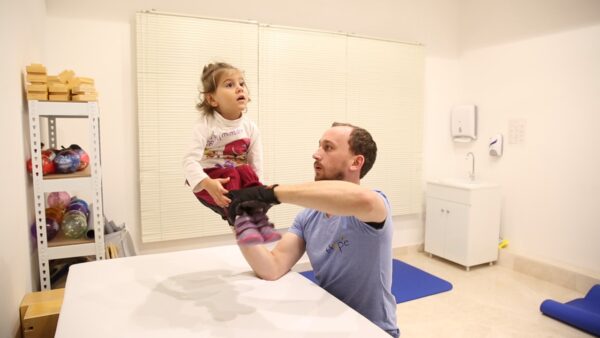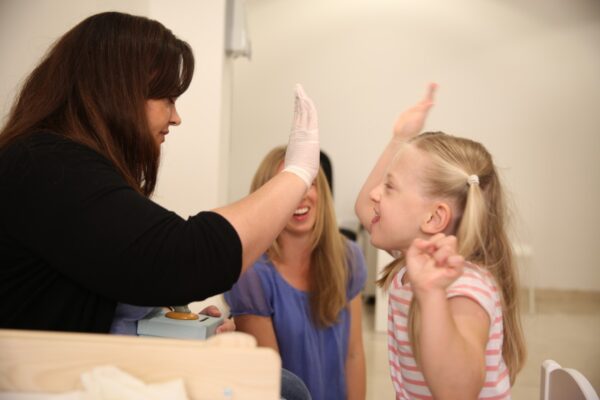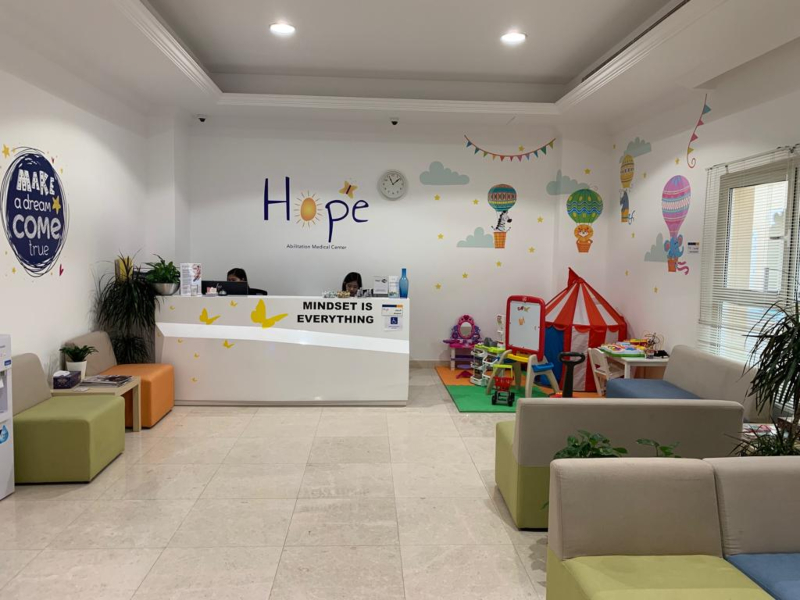Six years ago, Amal Tolba was in Egypt and went into labor with her third child. It was a very complicated birth thanks to medical malpractice and her daughter, Dara, was stillborn.
“She acquired cerebral palsy due to birth asphyxia,” Amal says. “She was deprived of oxygen. I was administered a wrong epidural, and as a result, she was stillborn.”
In the first few months of her life, Dara spent a lot of time in hospital undergoing multiple operations. She lost the ability to eat and breathe on her own. “I wasn’t sure that she was compatible with life.”
Amal was told by many health professionals in Egypt and abroad that her daughter was a hopeless case. Experts she had consulted with in the United Kingdom had even told her that her daughter was not a candidate for oral eating.
Six years later, Dara now eats normally and eats the same food as her family without any assistance.

The initial hopelessness at the beginning of Dara’s life spurned Amal to travel the globe for years to seek out the latest innovations in treatments for her daughter. Regarding what doctors were telling her before, “I thought they did not understand much about what she was going through and I was not ready to accept this answer. I didn’t listen and I found brilliant stuff.”
Shortly after Dara’s birth, Amal and her family relocated to Dubai. “I would travel and then come back here because a lot of the therapists that I was visiting in France, the UK and the US had colleagues here.”
Because she had also no support at the time, Amal established her own support group with other mothers of children with disabilities she would run into on trips to therapy centers, which laid the foundations for her business venture.
Through her quest to fight for her daughter to have a normal life, Amal became the founder and managing director of Hope Abilitation Medical Center, a pediatric center based in Dubai that covers a multitude of specialties in child healthcare, practicing many treatments and interventions which cannot be found elsewhere in the Middle East.

“We call it abilitation because it’s not rehabilitation. We give these children new abilities.”
Hope was Amal’s way of bringing everything she had encountered under one roof, a one-stop shop to provide all if not most childcare needs. For herself, it was a dream to have a facility where all the care her daughter needed could be found in one place.
“When I traveled, I came across brilliant approaches, therapies and techniques that are not offered in this part of the world. I wanted this to be here so I didn’t have to travel. It was not sustainable. I have two other teenagers that I couldn’t leave behind. I was hoping that it would give my child and all the other children in my support group a chance of better therapy.”
Hope’s client base only kept growing over the next three years, with the range of services and treatments it was able to provide constantly expanding. “It grew and became regional and we received a lot of international patients. My reach is now not only the UAE. We’ve received hundreds of patients from Saudi Arabia, Kuwait, Bahrain, Pakistan, India, Japan, Ukraine, Turkey and all over Africa.”

Coming across many innovations and new research across the world, Amal identified a crucial gap in treating children with special needs and disabilities: a lack of teamwork and collaboration.
“I was told that my child was not a candidate for oral eating when she was. That was because the folks in London didn’t know that folks in Austria invented something for those children. Everybody was in a distant island. Those people need to start to communicate. There are millions of techniques and approaches that are offered and all you need to do is just bring them under one roof.”
Hope’s profits are also always reinvested into the business, covering training of staff, expansions and acquiring the latest technologies. “If I find something that’s going to be costly but it’s going to help, I’m going to bring it in.”
In her travels, Amal also found a concerning lack of empathy with parents, a quality she says that Hope stresses on with patients and their families and which led to them gaining a well known and good reputation.

She also shed light on some of the most crucial gaps in the needs of people with disabilities in Egypt and the wider region, one of which is the lack of affordable care.
“It’s very expensive to have a child with special needs in terms of services, therapies, interventions, surgeries and the equipment that you need. They are not readily available. You need to order them from abroad and they are usually very expensive and will eventually be outgrown. Families spend fortunes. A family with an average income that does not have proper insurance coverage will struggle.”
She stresses the need for a platform where people can exchange the equipment they outgrow or no longer need to help make accessibility and disability assistance more affordable.
To help address this gap, Hope offers several kinds of payment plans to help families on lower incomes or inadequate insurance coverage to be able to access their services, including sponsorships, relief, discounts, instalment plans and not charging extra when billing insurance companies.
“I believed in what I wanted to offer but I didn’t imagine that I would have hundreds of patients put their trust in me. Hundreds of parents that would travel to see us and seek treatment with us. We started as a rehabilitation center. I did not imagine or dream that we’d be a full fledged pediatric medical setup with all the specialties. Things went faster than we expected. But again, it’s a major responsibility because it’s not a business for me. It’s something that I do with passion. I like to know each single family that steps into the facility which [creates this] psychological bond that makes me feel responsible and wanting to help.”









